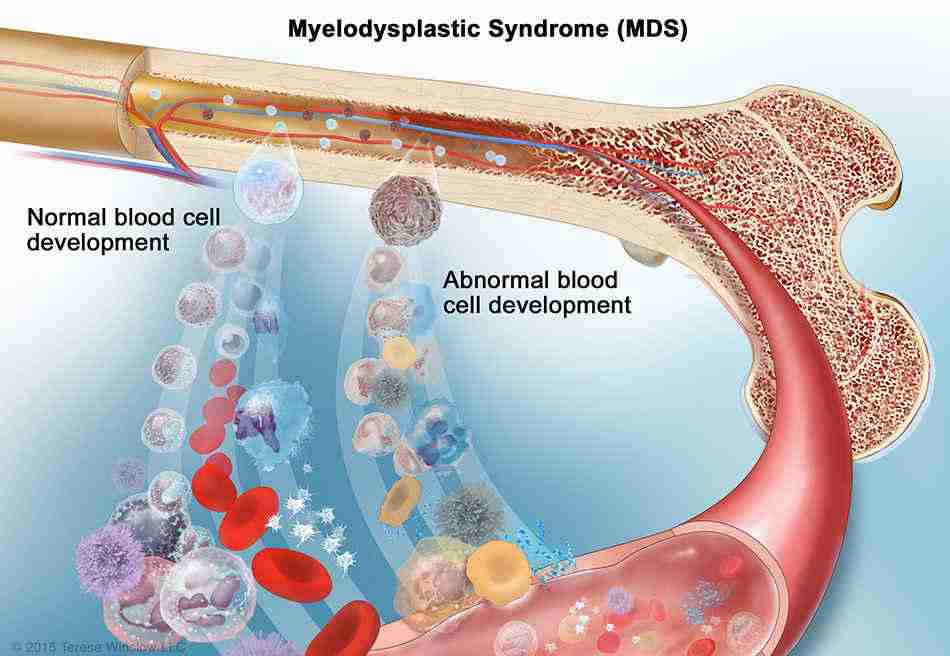
Myelodysplastic syndromes (MDS) are a group of disorders in which the bone marrow does not produce enough healthy blood cells. This can lead to low blood cell counts, making it difficult for the body to function properly. MDS can cause a range of symptoms, and it is important to be aware of these symptoms so that you can seek medical attention and receive appropriate treatment.
In this article, we will outline the common symptoms of myelodysplastic syndromes and provide information on what to look out for. It is important to note that the symptoms of MDS can vary from person to person, and some individuals may not experience any symptoms at all. However, being knowledgeable about the potential symptoms can help with early detection and treatment.
1. Fatigue
One of the most common symptoms of myelodysplastic syndromes is fatigue. This can be caused by a lack of healthy red blood cells, which are responsible for carrying oxygen to the body’s tissues. When the bone marrow is not producing enough red blood cells, it can result in feelings of extreme tiredness and exhaustion.
Patients with MDS may find that they have difficulty staying awake during the day, even after a good night’s sleep. This can significantly impact their quality of life and ability to carry out daily activities. If you are experiencing persistent fatigue, it is important to speak to a healthcare professional.
2. Shortness of Breath
Another common symptom of myelodysplastic syndromes is shortness of breath. This can occur as a result of low red blood cell counts, leading to decreased oxygen levels in the body. As a result, individuals with MDS may find it difficult to catch their breath even with minimal physical exertion.
If you are experiencing unexplained shortness of breath, it is important to seek medical attention, as this can be a sign of an underlying health issue such as MDS.
3. Easy Bruising and Bleeding
Low platelet counts in the blood can lead to easy bruising and bleeding in individuals with myelodysplastic syndromes. Platelets are responsible for clotting the blood and preventing excessive bleeding. When the bone marrow is not producing enough platelets, it can result in frequent bruising, nosebleeds, or prolonged bleeding from minor cuts or injuries.
If you are noticing an increase in bruising or bleeding without any apparent cause, it is important to consult a healthcare professional to determine the underlying cause.
4. Frequent Infections
Individuals with myelodysplastic syndromes may have a weakened immune system, making them more susceptible to infections. This is due to a lack of healthy white blood cells, which are responsible for fighting off infections and illnesses. Common signs of a weakened immune system can include frequent infections, such as colds, flu, or urinary tract infections.
If you are experiencing recurrent infections, it is important to speak to a healthcare professional to determine the cause and receive appropriate treatment.
5. Pale Skin
Low red blood cell counts in individuals with myelodysplastic syndromes can lead to pale or jaundiced skin. This is due to a lack of healthy red blood cells that are responsible for giving the skin its rosy hue. If you are noticing changes in the color of your skin, it is important to seek medical attention to rule out any underlying health issues such as MDS.
Pale skin can also be accompanied by other symptoms such as weakness and dizziness, and it is important to address these symptoms with a healthcare professional.
6. Weakness
Weakness and feelings of lethargy can be a common symptom of myelodysplastic syndromes. This can be attributed to a lack of healthy blood cells, leading to decreased energy levels and physical strength. Individuals with MDS may find that they struggle with everyday tasks and feel consistently weak and fatigued.
If you are experiencing persistent weakness, it is important to consult a healthcare professional to determine the underlying cause and receive appropriate treatment.
7. Enlarged Spleen
Some individuals with myelodysplastic syndromes may experience an enlarged spleen, which can cause discomfort or pain in the left upper abdomen. The spleen is responsible for filtering the blood and removing old or damaged blood cells. In individuals with MDS, an enlarged spleen can occur as a result of an increased workload due to abnormal blood cell production in the bone marrow.
If you are experiencing pain or discomfort in the left upper abdomen, it is important to seek medical attention to determine the cause and receive appropriate treatment.
8. Frequent Fever
Individuals with myelodysplastic syndromes may experience frequent fevers as a result of a weakened immune system. When the body is unable to effectively fight off infections, it can lead to recurrent bouts of fever. If you are experiencing persistent fevers without an apparent cause, it is important to consult a healthcare professional to determine the underlying cause and receive appropriate treatment.
9. Unexplained Weight Loss
Unexplained weight loss can be a symptom of myelodysplastic syndromes. This can be attributed to a lack of appetite and a decrease in energy levels, leading to unintentional weight loss. If you are noticing a significant change in your weight without trying, it is important to seek medical attention to determine the underlying cause and receive appropriate treatment.
Unexplained weight loss can also be accompanied by other symptoms such as weakness and fatigue, and it is important to address these symptoms with a healthcare professional.
10. Cognitive Changes
In some cases, myelodysplastic syndromes can lead to cognitive changes such as confusion or difficulty concentrating. This can be attributed to decreased oxygen levels in the body as a result of low red blood cell counts. If you are experiencing unexplained cognitive changes, it is important to seek medical attention to determine the cause and receive appropriate treatment.
Cognitive changes can significantly impact daily functioning and quality of life, and it is important to address these symptoms with a healthcare professional.

















